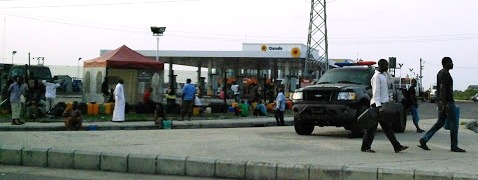Look at the pictures below. In one you’ll see the line for a gas station: it’s about two or so miles long, and as it gets closer to the station the line doubles. In the other picture, people wait at the station to fill plastic containers. The average waiting time is 3 to 4 hours – and yet this is not an infrequent situation. How can it be so hard to get hold of oil in a country like Nigeria, which is so rich in it?

The answer is not a straightforward one: a number of factors contribute to the situation, including economic and political factors. The price of oil is regulated, and it’s used as a political weapon. That’s why it’s subsidized, and it’s sold at an artificially low price, much lower than in the international markets. To give you an idea, a liter of gas goes for N 97 at the retail station (€ 0.43 or U.S. $ 0.59).
The capacity of local refineries is not enough to supply oil to cover domestic demand, and many are not even fully operational. In addition, the militia control the Delta area, the main oil-producing zone in the country.

Oil marketers have a license to import petroleum products. Obviously, they pay the international price, but then receive a governmental subsidy to sell it at the regulated price. A part of this import, however, is often siphoned off – post subsidy – and sold on the international market at a higher price. In this sense, Lamido Sanusi, governor of the Central Bank of Nigeria, was last month suspended for blowing the whistle on €20bn of diverted oil revenue.
Isn’t it amazing that Nigerians can’t enjoy their own natural resources? I don’t intent to offer a full explanation for why Nigerian queue to get gas but I hope to have provided a feeling for what the situation is like.


To have referred to the suspended CBN governor as a whistle blower means you really don’t have an understanding of the event leading to that or you chose to be overtaken by sentiment.
Hamza, I admit that having been in Nigeria for only three months I don’t have a full understanding of this very complex situation, nor did I claim that! It would be great if you elaborate on your own perspective of the situation: this blog is meant to serve as a platform for joint learning by exchanging perspectives and opinions, and yours are very welcome!
These pictures seems to be good and this article is very interesting about the rich oil country. Thanks for sharing.
Thank you for your comments, William!
Interesting post Africa. the situation in Nigeria is appalling, but the situation is almost the same in many other oil producing countries across Africa. the main distinction, in my opinion is rampant corruption in Nigeria, which as a result has led to the shortages. A country of Nigeria’s capacity (in terms of population, and resources) should be one of the most developed countries in the world. unfortunately, due to unaccountability of politicians, most of the country’s wealth is being siphoned into the hands of a few. i hope this phenomenon is curbed sooner rather than later, to bring Nigeria the glory it deserves and to eliminate or at least reduce adverse poverty in the region
Chris, this is the same impression as I got during my visit. It may take a generation to change the situation, but I’ve seen lots of energetic people willing to contributing bring the country to the next stage — this brings hope!